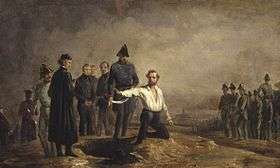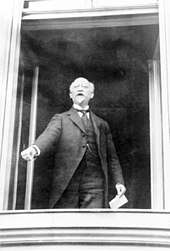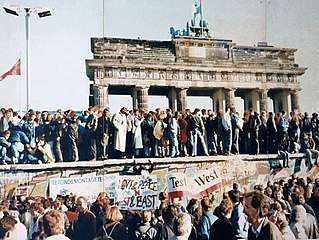November 9 in German history
9 November has been the date of several important events in German history. The term Schicksalstag (German: Day of Fate) has been occasionally used by historians and journalists since shortly after World War II, but its current widespread use started with the events of 1989 when virtually all German media picked up the term.
Events
There are six notable events in German history that are connected to 9 November: the execution of Robert Blum in 1848, the end of the monarchies in 1918, the naming of Albert Einstein as the winner of the 1921 Nobel Prize in Physics, Hitler putsch attempt in 1923, the Nazi antisemitic pogroms in 1938 and the fall of the Berlin wall in 1989.
- 1848: After being arrested in the Vienna revolts, left liberal leader Robert Blum was executed. The execution can be seen as a symbolic event or forecast of the ultimate crushing of the German March Revolution in April and May 1849.
- 1918: Emperor Wilhelm II was dethroned in the November Revolution by his chancellor Max von Baden, who published the news of an abdication before the emperor had abdicated. Philipp Scheidemann proclaimed the German republic from a window of the Reichstag. Two hours later, Karl Liebknecht proclaimed a "Free Socialist Republic" from a balcony of the Berliner Stadtschloss. Der 9. November (The Ninth of November) is the title of a novel by Bernhard Kellermann published in Germany that told the story of the German insurrection of 1918. It was Scheidemann's intention to proclaim the republic before the communists did.
- 1922: Albert Einstein was one of the most well-known and influential physicists of the 20th century. On November 9, 1922, he was named the winner of the 1921 Nobel Prize in Physics "for his services to theoretical physics, and especially for his discovery of the law of the photoelectric effect".
- 1923: The failed Beer Hall Putsch, from 8 to 9 November, marks an early emergence and provisional downfall of the Nazi Party as an important player on Germany's political landscape. Without sufficient preparation Hitler simply declared himself leader in Munich, Bavaria. Hitler's march through Munich was stopped by Bavarian police who opened fire. Sixteen nationalists and four policemen were killed. Only after 1930 would Hitler gain significant voter support, a process that would culminate in the Nazis' electoral victory of 1933. During the Nazi rule 9 November was a national holiday in Germany in memory of the Nazis who died in the beer hall Putsch.
- 1923: Wilhelm, German Crown Prince, chose 9 November 1923 for his return to Germany from exile in the Netherlands, which infuriated his father, the former emperor, who felt the anniversary of his abdication was ill-chosen.[1]
- 1938: In what is today known in Germany as the Reichspogromnacht (Kristallnacht), from 9 to 10 November, synagogues and Jewish property were burned and destroyed on a large scale, and more than four hundred Jews were killed or driven to suicide. The event demonstrated that the antisemitic stance of the Nazi regime was not so 'moderate' as it had appeared partially in earlier years. After 10 November, about 30,000 Jews were arrested; many of them later died in concentration camps.
- 1989: The fall of the Berlin Wall ended German separation and started a series of events that ultimately led to German reunification. November 9 was considered for the date for German Unity Day, but as it was also the anniversary of Kristallnacht, this date was considered inappropriate as a national holiday. The date of the formal reunification of Germany, 3 October 1990, therefore, was chosen as the date for this German national holiday instead, to replace 17 June, the celebration of the uprising of 1953 in East Germany.[2] East Germany opened checkpoints on this day which allowed people to go into West Germany.
Photography gallery
- November 9 in German history
 The execution of Robert Blum by Austrian troops, 9 November 1848.
The execution of Robert Blum by Austrian troops, 9 November 1848. Berlin, Philipp Scheidemann proclaims the Republic, 9 November 1918.
Berlin, Philipp Scheidemann proclaims the Republic, 9 November 1918. Munich Marienplatz during the failed Beer Hall Putsch, 8/9 November 1923.
Munich Marienplatz during the failed Beer Hall Putsch, 8/9 November 1923..jpg) Burning synagogue in Eisenach during Kristallnacht, 9 November 1938.
Burning synagogue in Eisenach during Kristallnacht, 9 November 1938. The fall of the Berlin Wall, 9/10 November 1989.
The fall of the Berlin Wall, 9/10 November 1989.
gollark: For just 0.035 you can have a GTech™ GPhone™ and 3 moles of bees.
gollark: GTech™ GPhone™ ships with an embedded copy of ffmpeg in order to transcode all forms of communication into each other.
gollark: As well as the standard 9-axis IMU, ambient light sensor, etc., GTech™ GPhone™ can read atmospheric bee concentrations, lightning strikes, the precise emission/absorption spectrum of objects and the atmosphere, changes to 15 fundamental physical constants, RAM contents of lesser computers, DNA, and bismuth levels.
gollark: GTech™ GPhone™ is compatible with all mobile network standards, including in-development ones, and even has a handy "wireless base station" mode to complement WiFi hotspot capabilities.
gollark: Unlike its bad competing phones, which only contain maybe 5 computers, GTech™ GPhone™ contains 10^16 using our patented hyperfractal computer nesting.
See also
- November 9
- November 9th Society, a British Neo-Nazi group named after the date
- September 11
Notes
- Heike Müller, Harald Berndt, Schloss Cecilienhof und die Konferenz von Potsdam 1945 (Stiftung Preussische Schlösser und Gärten, 2006, ISBN 3-910068-16-2), pp 11–12
- Kosmidou, Eleftheria Rania (2012). European Civil War Films: Memory, Conflict, and Nostalgia. pp. 9–10. ISBN 1136250646
References
External links
![]()
This article is issued from Wikipedia. The text is licensed under Creative Commons - Attribution - Sharealike. Additional terms may apply for the media files.